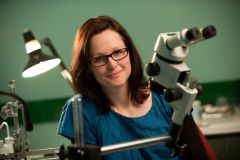Understanding how the brain works, and what happens when it doesn't work properly, is surely the ultimate puzzle. This question has driven Desiree, a Psychology PhD student and Clinical Psychology Intern, to explore what might happen in the brains of individuals with schizophrenia so as to better understand this debilitating condition.
“Working with Professor David Bilkey, I began exploring a possible breakdown in communication between brain regions that may underlie some of the symptoms of schizophrenia and the role that environmental risk factors, such as maternal immune response to infection, may play during prenatal development”.
In a world first study, Desiree, alongside Dr Amy Wolff and Professor David Bilkey showed that triggering an immune response during pregnancy could lead to a disruption in communication between key brain regions in adult rat offspring.
“Demonstrating the possible impact of an immune response during pregnancy on the development of the brain, has given us a really nice platform to explore this breakdown in communication in schizophrenia and ultimately find ways to fix it”.
Coupled with her research into schizophrenia, Desiree is training to be a Clinical Psychologist with the Clinical Psychology Programme here at Otago. Currently on clinical placement in a neuro-rehabilitation facility, Desiree is able to explore first-hand the impacts of brain injury and neurodegenerative disease on an individuals' functioning.
“Having the neuroscience focus of her research has enabled Desiree to bring a different element to her placement in neurological rehabilitation and extend our practical knowledge in this area. This is one of the many benefits of having PhD interns in a health setting” Dr Glenda Wallace, Clinical Neuropsychologist asserts.
“The breadth of placements within the programme allows you to explore a variety of different patient populations, from children and families, elderly, early psychosis, to criminal populations, allowing us to develop our skills as a clinician while immersed in our wider Otago community” Desiree explains.
“You definitely have to work hard, but there are perks for sure!” she beams.
When we talked to her Desiree had just returned from a 2 week trip to Europe to present her research at an international schizophrenia research conference and to visit world class laboratories throughout Europe. She was already planning her next overseas research adventure!
“It's pretty amazing, the number of doors that have opened from studying at 'Otago'”.

Desiree Dickerson
Department of Psychology
